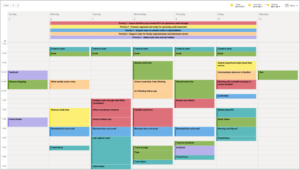There are so many reasons that mandating a shared digital calendar, like Outlook or Google, makes sense: scheduling meetings, sharing invitations and so on. No one questions this logic.
But what about requiring systems for To-Do’s? Should you take the plunge? How would it even work?
I recently spoke with Lige Shao, a Director at Rocketship Education, about her organization’s adoption of Wrike, an online project management tool, to help facilitate their work opening new schools.
Maia: Why did you all decide to go “on the same system?”
Lige: Opening new schools is a highly cross-functional, long-term, and complex effort. Like many other charter networks, Rocketship teams used to operate independently, and frequently on an ad hoc basis. This worked when we were just a few schools in San Jose with a small team sitting in the same room. But as we’ve grown and moved into new regions — Milwaukee in 2013, Nashville in 2014, and soon-to-be Washington, DC, in 2016 — opening new schools has become an increasingly complex process. In order to avoid risky delays and additional costs, we needed to clarify roles and responsibilities and coordinate across functions more deliberately.
Maia: Why did you select Wrike to help you do this?
Lige: We looked for a tool that would not only address the issues we were facing, but also adapt well to the range of users across Rocketship. Wrike offered a balance of functionality — project plans, dashboards, and integration with email — via a relatively clean and intuitive interface. Wrike also offers crucial customer support, including a 24-hour online chat, a dedicated customer service representative, and a structured onboarding process.

Click to enlarge

Click to enlarge
Maia: Because the success of any tool really depends on its usage, how will you roll out support and train your teams?
Lige: We piloted Wrike with a small group of strong project managers at Rocketship, who became Wrike “champions” for different teams. They provided helpful input on how to use and present the system. We then communicated the rationale and timeline for the transition, along with how we planned to use Wrike for school startup. We’ve been meeting with each team to demonstrate how to build out their plans in the system. We’ve also shared existing resources and tutorials from Wrike, and plan to set up three live trainings for anyone who wants more help.
I’m in agreement with Lige: When you’re facing a massive project or initiative, with multiple teams and many moving pieces, I’m a fan of a required system. What I don’t like is when I hear a team leader tell everyone to use Google Tasks to manage their own To-Do’s. That’s just a recipe for rebellion.
Of course, you don’t have to use Wrike (though I really like how clean it is!). We’ve also written about Asana, and here is a review of several other tools from the “techie” side.
Are there any upcoming projects for which you need an agreed upon and shared system?


